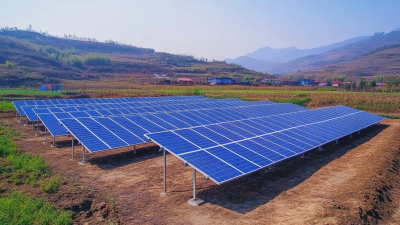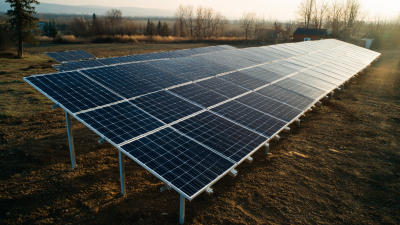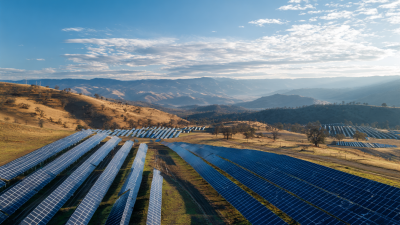Tel : 94870 36000, 94860 36000, 94890 36000
Unlocking Energy Independence: Benefits of Solar Panel Off Grid Systems for Global Buyers
As the global demand for sustainable energy solutions grows, the solar panel off-grid system emerges as a transformative option for energy independence. According to a recent report by the International Renewable Energy Agency (IRENA), renewable energy accounted for nearly 30% of total global power generation in 2022, underscoring a shift away from traditional fossil fuels.
 Solar panel off-grid systems not only contribute to this trend but also offer unparalleled benefits, such as enhanced reliability, reduced energy costs, and improved energy autonomy. As more consumers and businesses seek ways to mitigate their environmental impact while securing a reliable energy source, the adoption of solar panel off-grid systems is anticipated to rise significantly.
In fact, a 2023 market analysis indicates that the off-grid solar market is projected to grow at a compound annual growth rate (CAGR) of 25% over the next five years, reflecting a burgeoning interest among global buyers in harnessing the power of the sun for their energy needs.
Solar panel off-grid systems not only contribute to this trend but also offer unparalleled benefits, such as enhanced reliability, reduced energy costs, and improved energy autonomy. As more consumers and businesses seek ways to mitigate their environmental impact while securing a reliable energy source, the adoption of solar panel off-grid systems is anticipated to rise significantly.
In fact, a 2023 market analysis indicates that the off-grid solar market is projected to grow at a compound annual growth rate (CAGR) of 25% over the next five years, reflecting a burgeoning interest among global buyers in harnessing the power of the sun for their energy needs.
Table of Contents
[Hide]
The Rise of Off-Grid Solar Systems: A Shift Towards Energy Independence
The shift towards energy independence has become increasingly pronounced, with off-grid solar systems leading the charge. According to a report by the International Renewable Energy Agency (IRENA), the off-grid solar market is projected to reach 1.5 billion users globally by 2025, representing a significant shift in how individuals and communities approach energy consumption. As consumers seek alternatives to traditional energy sources, the appeal of these systems lies in their potential for energy self-sufficiency and reduced reliance on fossil fuels.
Adopting an off-grid solar system provides several benefits. For instance, households can save on energy bills and contribute to a more sustainable future by utilizing renewable energy. Additionally, these systems can offer reliable electricity in remote areas where grid access is limited. As per the World Bank’s report, an estimated 1.1 billion people worldwide still lack access to electricity, and off-grid solutions like solar power can bridge this gap effectively.
**Tips for Choosing the Right Off-Grid System:**
- Evaluate your energy needs: Before investing, assess your daily energy usage to determine the appropriate system size.
- Consider battery storage: A reliable battery system is crucial for ensuring a consistent power supply during cloudy days or nighttime.
- Research financing options: Many governments and organizations offer incentives or financing plans to help reduce the upfront costs of solar installations.

Key Benefits of Solar Panel Off-Grid Systems for Global Consumers
Off-grid solar panel systems are increasingly recognized for their profound benefits, particularly for global consumers seeking energy independence. According to the International Renewable Energy Agency (IRENA), off-grid solar solutions can reduce energy expenses by up to 75% for households in remote areas. This capacity to significantly lower electricity bills not only alleviates financial burdens but also empowers consumers with a reliable energy source, free from the uncertainties of traditional power grids.
Moreover, these systems offer a crucial environmental advantage. With the Global Carbon Project indicating that energy production is responsible for over 70% of global greenhouse gas emissions, off-grid solar solutions provide a cleaner alternative. As more consumers transition to renewable energy, they can contribute to global efforts aimed at mitigating climate change. A report from the World Bank estimates that shifting to solar energy could reduce carbon emissions by approximately 1.1 billion tons annually. Thus, adopting solar panel off-grid systems not only benefits individual consumers but also plays a pivotal role in fostering a sustainable future.

Financial Savings and Long-Term ROI of Investing in Off-Grid Solar Technology
Investing in off-grid solar technology offers compelling financial savings and a robust long-term return on investment (ROI) for global buyers. According to the International Renewable Energy Agency (IRENA), the cost of solar photovoltaic (PV) systems has decreased by over 85% since 2010. This significant reduction means that homeowners and businesses can harness solar energy without incurring hefty upfront expenses, making solar panels more accessible than ever. Furthermore, off-grid systems provide energy security and independence, insulating buyers from volatile energy prices and grid failures.
When assessing the ROI of off-grid solar systems, many buyers reach a payback period of just 5 to 7 years, depending on local sunlight exposure and system size. Subsequent savings can amount to thousands of dollars annually, especially in regions where electricity costs are high. A report from BloombergNEF indicates that, as of 2021, financial returns on solar investments have consistently outpaced traditional energy investments, achieving average annual returns of 15-20%.
Tip: When planning your off-grid solar investment, explore government incentives or rebates. Many regions offer financial programs that can significantly lower your initial costs, enhancing your project's overall ROI.
Environmental Impact: How Off-Grid Systems Contribute to Sustainable Energy Goals
Off-grid solar panel systems play a pivotal role in advancing sustainable energy goals, significantly contributing to environmental health and energy independence. As highlighted in recent studies, transitioning to renewable energy sources like solar not only reduces greenhouse gas emissions but also helps meet international climate commitments, such as those outlined in the Paris Agreement. For instance, achieving a net-zero energy building (NZEB) standard is essential for minimizing the carbon footprint of the construction sector, which is responsible for a substantial portion of global energy consumption.
Moreover, research indicates that Africa, with its vast renewable energy potential, could alleviate energy poverty by harnessing just 25% of its resources. This could drive sustainable economic growth and enhance energy security across the continent. Moreover, hybrid systems that combine solar power with biomass and battery storage show promise in maximizing energy output while ensuring reliability, as evidenced by recent techno-economic analyses in regions like Vietnam. Such advancements not only foster energy independence but also align with global sustainable development goals, making off-grid solar systems a crucial investment for environmentally conscious buyers worldwide.
Benefits of Solar Panel Off-Grid Systems for Energy Independence
This chart illustrates the various benefits of solar panel off-grid systems, highlighting how they contribute to energy independence. The percentages represent the effectiveness of each benefit, focusing on cost savings, energy security, sustainability, environmental impact, and energy access.
Comparative Analysis: Off-Grid Solar vs. Traditional Energy Sources in Data and Cost
When examining the financial and operational differences between off-grid solar systems and traditional energy sources, several key factors emerge.
Firstly, the initial investment for solar panel installation can be significant; however, it often pays off over time.
Off-grid solar systems eliminate monthly electricity bills and reduce dependency on fluctuating energy prices associated with fossil fuels.
This long-term saving can dramatically alter the energy cost landscape, particularly for remote or underserved areas where traditional energy infrastructure may be lacking or prohibitively expensive to develop.
Comparatively, traditional energy sources often incur hidden costs, such as environmental impact fees and fluctuating fuel prices.
These costs can escalate unexpectedly, impacting overall budget stability for consumers.
Off-grid solar systems, while requiring maintenance and occasional battery replacements, provide a predictable energy cost scenario, allowing global buyers to better manage their finances.
Additionally, the flexibility and resilience of off-grid solar power mean that consumers can avoid the pitfalls of outages or energy scarcity commonly associated with traditional energy sources, ultimately leading to a more sustainable and self-sufficient energy solution.
Related Posts
-

Exploring the Future of Solar Energy Innovations in 2025 with the Best Solar Panels Solutions
-

Top 10 Solar Panel Solutions from Chinese Manufacturers at the 137th Canton Fair
-

China's Best Off Grid Solar Panels For Global Quality You Can Trust
-

Quality That Earns Global Respect Best Solar Panels Solutions Made in China
-

Unlocking Success: Essential Tips for Sourcing Premium Best Home Solar Suppliers Globally
-

10 Reasons Solar Electricity is the Future of Energy with 85 Percent Growth Expected by 2030

